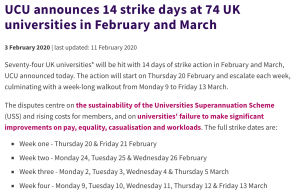In November and December 2019, members of the University and College Union (UCU) – the trade union that represents many academics and other university staff in the UK – went on strike. On that occasion, in his post To Strike or Disrupt, Liam Shields discussed whether people not doing any teaching during the strike should go on strike or not, seeing that their striking does not result in significant disruption.
At the end of this week, the UCU will embark on a new wave of 14 days of strike spread over four weeks because the dispute remains unsettled. It therefore seems a good occasion to recall Liam’s argument and to flesh out some implications a bit further.



